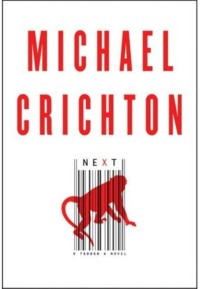| Michael Crichton will probably never be acknowledged as a brilliant writer known for the beauty of his writing or the brilliance of his characterizations. Too often his writing is perfunctory and his characters cardboard, frequently all speaking with the same voice.
However, as a storytelling prestidigitator, he has succeeded admirably at writing bestselling techno-thrillers about the dangers of genetic experiments, bio-engineering and technology gone wild.
His original efforts for film like Westworld, Looker, and Runaway have been lighter works, less grounded in their science, but fun to watch so long as the action keeps moving to prevent us from thinking too deeply about the plausibility of the onscreen events. And so it should be with his novels.
|
 |
In his new thriller, Next, Crichton is concerned with genetic research, genetic implantations, genetic legalities and the issue of genetic patents. If readers are unfamiliar with Crichton's previous work, it will not take them long to realize that this an area of great interest to him and, if any doubt lingers, a bibliography of several pages attests to his research. Unfortunately, in his attempt to cover several aspects of one topic, his story becomes diffused and ultimately falls back on less than convincing coincidences. The story stutters, stalls and, to his disadvantage, lets us ponder the creator's machinations.
We are introduced to BioGen, a genetics research laboratory that believes it has discovered a gene that can induce conformity in human beings, ridding them of excessive, extravagant behavior and could, by promoting sensible behavior, possibly be a cure for compulsive and addictive behaviors. To protect their investment and future cost of development they have patented the genetic material taken from a patient and established ownership of his genes, leaving him out of potential goldmine that could yield billions of dollars.
An elaborate scheme is launched against BioGen to bring the company down and destroy their supply of the precious gene in order that another company may profit from their use. That this company agrees to pay the original donor a royalty on the gene but is rushing to get the inadequately tested product into pharmacies only confuses the ethics of the situation.
At the same time, but in separate parts of the world, transgenic experiments with animals have yielded a talking orangutan in a nature park, an African Grey parrot that can speak and think, and a humanzee, a boy half human and half chimpanzee.
Such unusual events could have share a common ground which would make it feasible that they would all wind up together by story’s end. However, the only common ground they share is that they all feature transgenic experiments, the experiments themselves independently conducted and unconnected. That they do converge in the denouement stretches credibility to the breaking point, far too convenient to be anything more than a contrivance by the author. Crichton should show his fans a little more respect.
The story begins promisingly enough and continues to hold interest as the sub-plot of industrial sabotage is introduced. Then, a mother and her child become the subject of a manhunt by a modern day bounty hunter, relentlessly determined to bring them in at all costs. Even the plot thread with the humanzee, reminiscent of the somewhat cliched intelligent monkey movie, initially shows promise. But too many plot threads have started to diffuse the focus of the story.
Then, somewhere along the way, as the humanzee begins expectedly to exhibit the all too familiar natural behavior of a chimp, as the opportunists expectedly attempt to capture the talking orangutan to reap riches, and as the talking parrot goes from an amusing to annoying to slapstick character, there is a sense that this important idea has taken on aspects of a three-ring circus. By the time we reach the end this very topical idea has been trivialized.
An author is allowed a miss here and there. Crichton has written a number of bestselling books and movies that have managed to entertain while offering valid, thought provoking warnings regarding the uses of science and technology. As time has gone forward, Crichton has occasionally decided to perform his civic duty as a socially responsible (and well rewarded) citizen by grabbing a soapbox and selling his sermons in letters writ large. Witness Disclosure and State of Fear, books that still entertained while reminding us that the author had an agenda. As a doctor (remember that he created television's ER) medical issues are near and dear to his heart. And he has investigated the ethics of genetics and bio-engineering in past works such as Jurassic Park and Prey books that put the storytelling ahead of the message and mechanics.
Crichton's warning is well meant, important, and should be heeded by the scientific and medical communities while being seriously considered by the general public. The consequences of genetic experiments could have far reaching benefits for the sick and dying. Currently, a debate rages over the plans of the parents of a disabled daughter to introduce genes into her system that will stunt her growth, preventing her from reaching adult maturity but making it easier for the parents to care for her and, theoretically, improving her lifetime comfort.
But Crichton's novels remind us that there may be unexpected side effects which cast doubt on the ethics of such procedures. And, at least in the case posited in this story, an individual may harbor valuable genetic attributes that could be marketed not only for the public's benefit but for their own financial enrichment. How to protect such profitable assets? In short, a great deal of thought needs to be given these issues, but events seem to move at speeds that eclipse the thinking needed to create rules and regulations governing them.
Unfortunately, good intentions do not equal good storytelling and ultimately Crichton lets the reader down by treading well-trod ground in an all too familiar manner.
|

